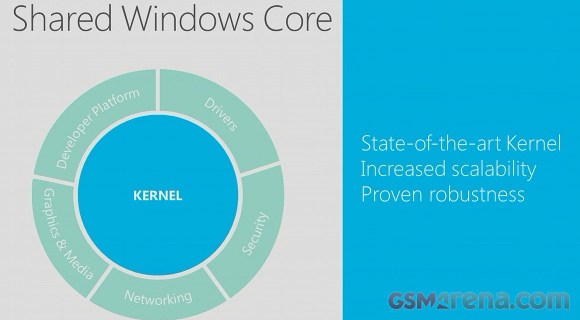
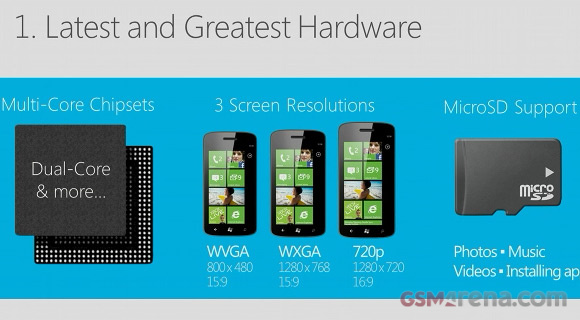
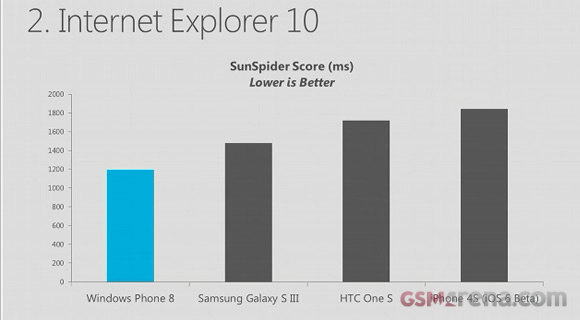
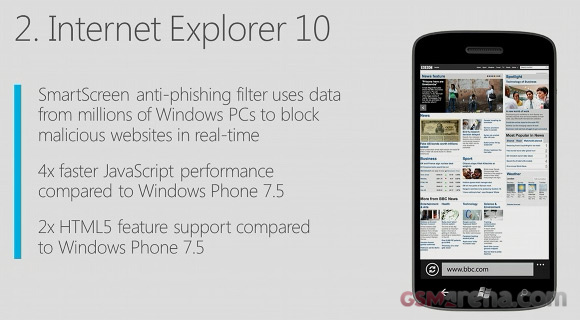
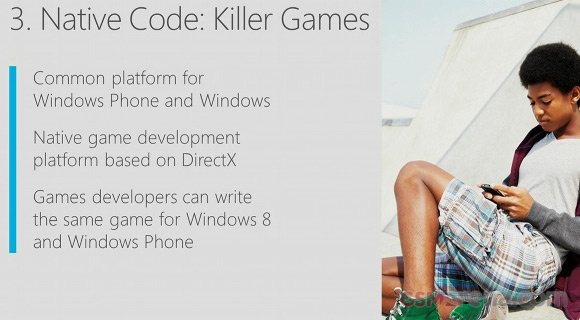
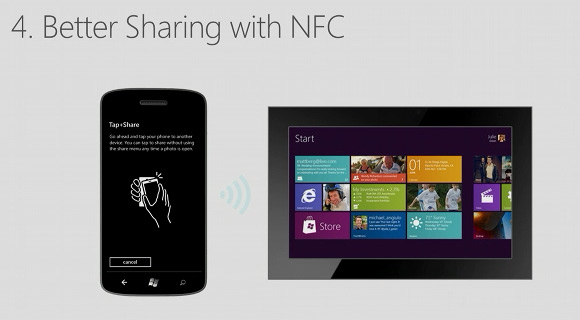
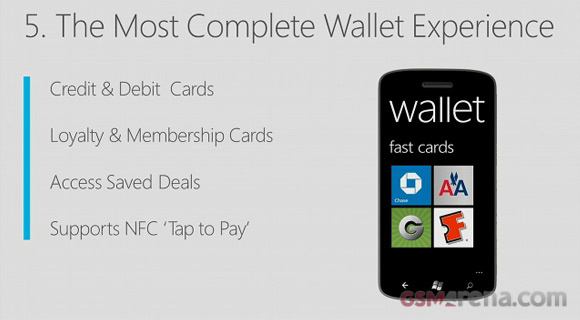
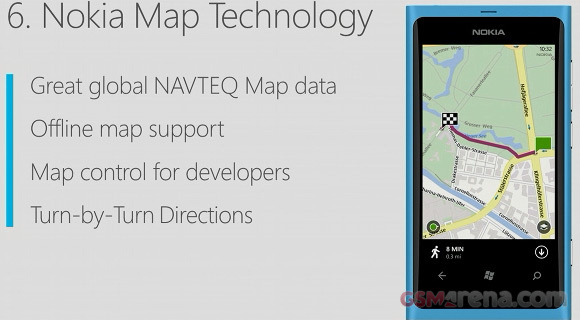
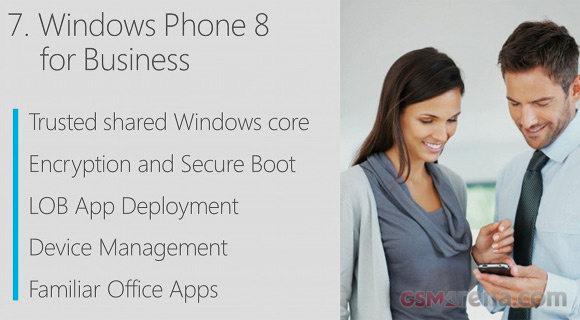
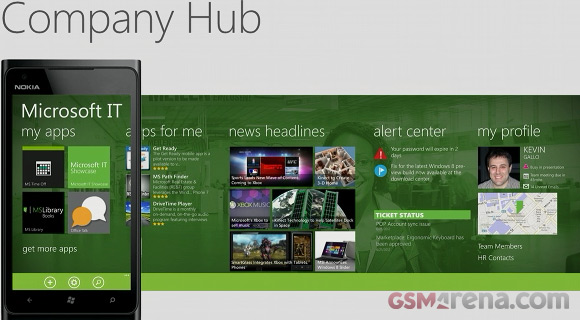
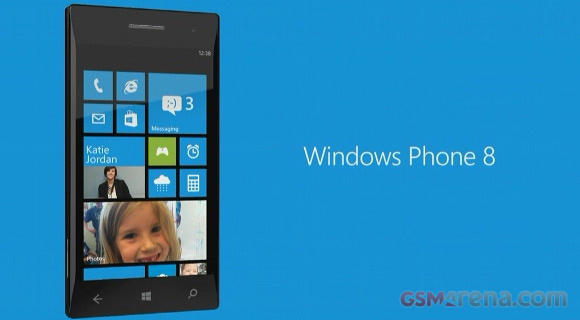
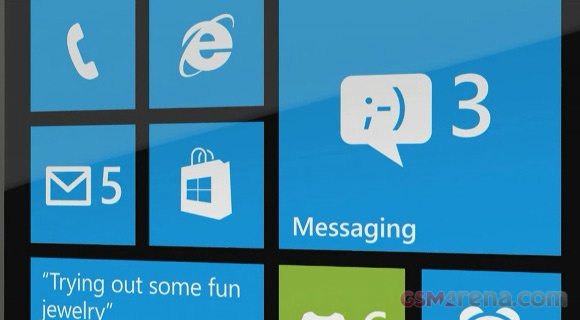
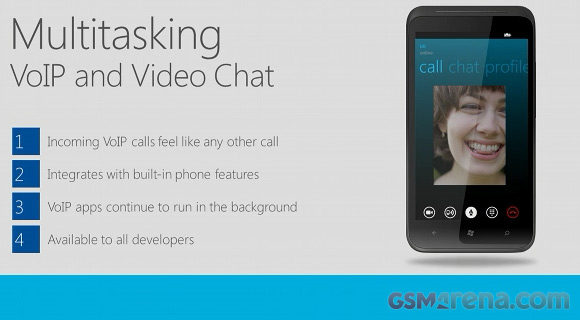
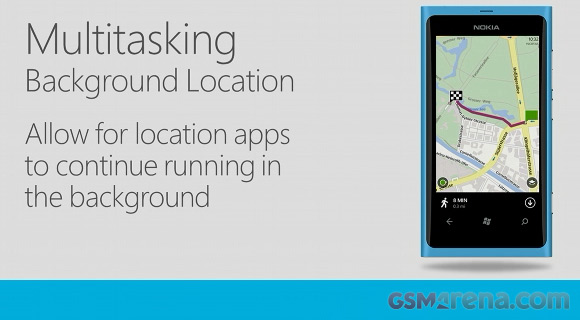
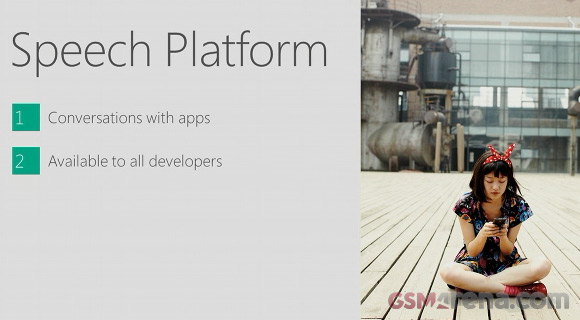
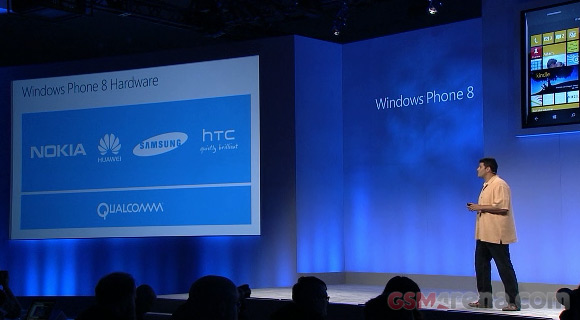
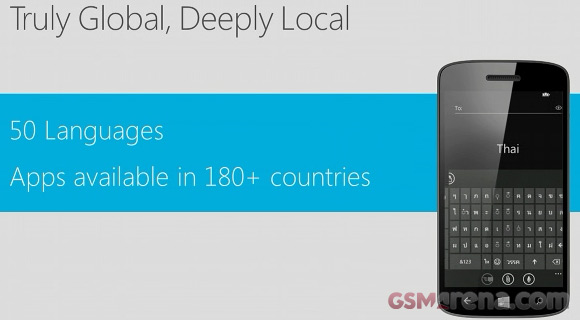
News : Microsoft officially unveils Windows Phone 8
DroidXDA
●
Wednesday, 20 June 2012
Microsoft held a press event today to give us a "sneak peek of the future of Windows Phone". Terry Myerson, VP of Windows Phone, took the stage and bragged that seven of the top nine phones in Amazon's marketplace are Windows Phone handsets.
But that's the past - Joe Belfiore took over to preview Windows Phone 8. One huge change in WP8 is the shared core. This means that Windows Phone 8 shares the kernel, drivers, security, graphics and more with Windows 8. With it, devs for either OS can easily port their work to the other platform.
Windows Phone 8 finally brings support for multi-core processors thanks to the shared kernel. For this fall, Microsoft will focus on dual-cores, but up to 64-core CPUs are a go in the future.
Next up, higher resolutions will be supported - WVGA is joined by 720p (1280 x 720) and WXGA (1280 x 768). All existing Windows Phone 7.5 apps will work without modification on the new OS regardless of the resolution.
Removable storage is another highly requested feature that will be debut on WP8.
Belfiore also showcased a game, Marble Maze, on a Windows 8 tablet that runs with minimal modifications on a Windows Phone 8 handset.
Windows Phone 8 will launch with Internet Explorer 10 preinstalled, which borrows a lot of pieces from its desktop counterpart. JavaScript performance is improved 4 times and sites that work on the desktop browser are said to work on the phone too.
IE10 on the phone will share in some security features of the desktop browser - like warning users of potentially malicious sites. The HTML5 support is improved both in terms of features and speed.
Windows Phone 8 also makes the jump to native code apps written in C and C++ - which allows both improved performance and easier porting of stuff like games from Windows 8 RT to Windows Phone 8.
The new Microsoft mobile OS will also offer full native support for NFC and it will even allow 3rd party apps to make use of it. A cool use for NFC is Tap-Send, which can be found in the share menu. It allows you to just tap two WP8 or Windows 8 devices to transfer a file between them.
The NFC support will also allow your phone to eventually replace a lot of things that you now need to keep in your wallet (all WP8 phones will have the NFC hub).
Microsoft bragged that its NFC wallet is better than Google's because the security is handled by the SIM card instead of the phone itself. The Wallet will debut on Orange France.
Wallet features Deals (digital discount coupon codes), which have Local Scout integration, so you can look for deals nearby. Deals can be found through web searches, handed out or acquired by third party apps and they can easily be shared with your contacts.
Wallet also handles buying apps and in-app purchases (which are new too). Wallet stores your credit cards and will ask you which one you want to use for each payment. You can set it up to ask for a PIN code, which will prevent other people from buying stuff from your phone.
The next major change introduced by Windows Phone 8 is Nokia's mapping services, which will replace Bing. The map data can be stored on the phone, so you can use it offline. All third party apps can use Nokia's services, even when you don't have a working data connection.
Windows Phone 8 hope to appeal to corporate users as well with secure boot and BitLocker encryption. It will allow administrators to manage devices remotely and push apps to them, which will really make supporting company phones a whole lot easier.
The other business-oriented feature that was showcased today is the Company Hub. It will allow a company to highlight apps specific to the company itself and make them easily accessible to its employees.
The next new platform feature is the updated start screen. It features new Live tile sizes - both smaller and bigger tiles are now available. And better still, the user gets to change the size of each live tile. WP7.5 tiles are compatible with the new Windows Phone release without requiring any modification and so are the WP7.5 apps.
Changing the size of a tile will change the functionality it offers. There will be more colors to choose from for the live tiles too.
Under the cover Windows Phone 8 comes with improved multitasking, which should lead to better performance of IM apps. For starters, Skype is much better integrated - e.g. the Skype call looks just like a regular phone call. Other VoIP services can make use of the new APIs, too, achieving similar integration.
The multitasking-related improvements go on - location-based apps (like SatNav and so on) can now work in the background even if you leave them to check a message, for example. And yes, it was about time they fixed that.
Windows Phone 8 will bring more competition to Apple's Siri. Not only does it come with improved system-wide virtual assistant, but third party developers will also be able to hitch a ride on Microsoft's speech platform and add voice commands to their apps. In its own words, Microsoft wants you to have a dialogue with each app.
Upcoming Windows Phone 8 devices will be built by Nokia, Samsung, HTC and Huawei on Qualcomm chipsets. The big name missing from this list is LG as the Koreans probably chose to focus on Android.
Unlike WP7, WP8 updates will be distributed over the air. Microsoft promises support for every WP8 device for at least 18 months.
Microsoft concluded the presentation by bragging about the extremely wide reach of Windows Phone 8. The platform's Marketplace will be available in 180 countries and the whole interface will be translated to 50 different languages. Right-to-left writing support is also enabled.
The official launch of Windows Phone 8 is scheduled for this fall, but that's as specific info as we got. Things should become a little clearer in the following weeks.
Source GSMarena.com
Subscribe to:
Post Comments (Atom)
Search this blog
Page Visitor Views
Popular Posts
-
Based on XPERIA MINI finally the fix and update we hope for been released on this new rom MiniX 02 : http://droidxda.blogspot.com/201...
-
If you are looking for a high performance pocket pc or a pendrive sized pc There's selection from MK802/808,UG802 & Other's ...
-
SnapSeries CM10 Jellybean Build FOR Huawei Ideos U8150 & (U8120&U8160)Not Fully DO READ FAQ @ POST #2 Code: /* * I...
-
CyanogenMod is a free, community built distribution of Android 4.2 (Jelly Bean) which greatly extends the capabilities of your phone. ...
-
Quote: SnapSeries CM10 Jellybean Build FOR Huawei Ideos U8150 & (U8120&U8160)Not Fully DO READ FAQ @ POST #2 Cod...
-
UPDATE 1: How to root Star X26i by using TPSparkyroot: Thanks to admonish 1. ( Optional ) Download Android SDK and install from here: ...
-
Although Nokia and HTC are generally the most active Windows Phone 8 manufacturers out there, let’s not forget there are several othe...
-
Ian MORRISON (linuxium) has tested Linux with several mini PCs powered by different processors. The main point of his tests was to evalu...
-
Grand Theft Auto III 1.3 Needs: Android 2.2 and higher devices. Summary: Rockstar Games: Grand Theft Auto III v1.3 For Android. Apk S...
-
New updates for Bluestacks Beta (Note: Please PM me if I missed out on any threads/updates!) Bluestacks Beta available here: http://...
Translate
Games
- ANDROID HD GAMES (2)
- J2ME GAMES (4)
Devices
samsung
(93)
Arc
(78)
arc s
(70)
xperia x8
(66)
Sony Ericsson
(64)
QUAD CORE
(60)
China Android
(57)
htc
(52)
Snapseries
(46)
Xperia 11
(46)
samsung galaxy s3
(42)
mtk
(36)
Qualcomm Snapdragon S4
(32)
huawei u8150
(30)
China Copy
(27)
LG
(27)
iphone 5
(25)
HTC ONE X
(24)
nokia
(23)
neo
(22)
nvidia tegra 3
(21)
Qualcomm APQ8064
(20)
Mini Board(Dev)
(19)
neo v
(19)
LTE
(18)
xperia x10
(18)
MK802
(17)
nexus 7
(17)
Qualcomm Snapdragon S4 Plus
(16)
galaxy nexus
(16)
window phone 8
(16)
xperia play
(16)
xperia x10 mini
(16)
Qualcomm MSM8960
(15)
Samsung Galaxy S2
(15)
ipad 3
(15)
quad-Core Exynos
(15)
MT6577
(14)
RK3066
(14)
LG OPTIMUS P500
(13)
xperia mini
(13)
xperia s
(13)
iphone 4
(12)
live with walkman
(12)
lumia
(12)
mini pro
(12)
u8120
(12)
xperia pro
(12)
ZTE
(11)
active
(11)
nexus 4
(11)
ray
(11)
samsung galaxy ace
(11)
Amazon Kindle Fire
(10)
asus
(10)
iphone 4s
(10)
u8160
(10)
GALAXY NOTE
(9)
galaxy note 2
(9)
xperia ion
(9)
xperia t
(9)
BLACKBERY
(8)
MK802 II
(8)
MT6575
(8)
ipad 2
(8)
mt6573
(8)
u8110
(8)
LG NEXUS
(7)
Snapdragon S1
(7)
Xperia GX
(7)
acer
(7)
motorola
(7)
nook tablet
(7)
u8180
(7)
xiaomi
(7)
xperia tx
(7)
HTC ONE X+
(6)
lumia 610
(6)
minipc
(6)
nokia n9
(6)
quad-core A6
(6)
u8100
(6)
u8150
(6)
BLACKBERY 10
(5)
HTC WILDFIRE
(5)
Huawei Ascend D Quad XL
(5)
XPERIA V
(5)
hp
(5)
hp touchpad
(5)
meizu mx
(5)
meizu mx quad core
(5)
motorola razr
(5)
motorola xoom
(5)
msm8690
(5)
nexus s
(5)
rockchip
(5)
xperia j
(5)
Ainol
(4)
BLACKBERRY PLAYBOOK
(4)
HTC WILDFIRE S
(4)
Nexus 10
(4)
Nvidia Tegra 2
(4)
PC STICK
(4)
POCKET PC
(4)
QUALCOMM
(4)
SAMSUNG GALAXY S
(4)
Samsung Galaxy S2 Plus
(4)
UG802
(4)
XIAOMI MI2
(4)
XPERIA NEO L
(4)
c660x
(4)
hp touchpad android
(4)
htc tattoo
(4)
lt30p
(4)
lumia 710
(4)
lumia 820
(4)
samsung galaxy y
(4)
xperia go
(4)
xperia sl
(4)
(Orange Boston
(3)
A1
(3)
A88
(3)
Apanda A60
(3)
Excalibur
(3)
F911)
(3)
HTC DESIRE HD
(3)
HTC INCREDIBLE S
(3)
HTC ONE S
(3)
LG E973 Optimus G
(3)
NVIDIA Tegra 4
(3)
Samsung Galaxy SIII Mini
(3)
Sony Ericsson Arc HD
(3)
Sony Ericsson Mix Walkman
(3)
Vibo A688
(3)
Windows RT
(3)
XT502
(3)
Xperia SX
(3)
Z71
(3)
Zopo
(3)
droid dna
(3)
galaxy gio
(3)
galaxy nexus 2
(3)
htc aria
(3)
htc explorer
(3)
huawei ascend p1 s
(3)
huawei honor
(3)
lumia 800
(3)
lumia 900
(3)
lumia 920
(3)
meizu m9
(3)
raspberry pi
(3)
samsung galaxy gio
(3)
star s1
(3)
ubislate7
(3)
x10
(3)
xperia 2012
(3)
xperia arco s
(3)
xperia c660x
(3)
xperia p
(3)
xperia yuga
(3)
yuga
(3)
Droid RAZR HD
(2)
HTC 8X
(2)
HTC Butterfly
(2)
HTC DESIRE S
(2)
HTC M7
(2)
HUAWEI Ascend D2 Quad
(2)
HUAWEI MEDIAPAD
(2)
Kindle Fire
(2)
Kindle Fire HD
(2)
LG OPTIMUS L9
(2)
LG X3
(2)
Lenovo
(2)
MT6577+
(2)
NOKIA 808
(2)
Novathor
(2)
SAMSUNG GALAXY ACE 2
(2)
Samsung Galaxy Ace Plus
(2)
Samsung Galaxy Premier
(2)
Snapdragon S3
(2)
Sony Ericsson ST21a
(2)
Teclast
(2)
UBUNTU PHONE
(2)
Xperia Tablet
(2)
ZOPO ZP100
(2)
a110
(2)
acro s
(2)
b1
(2)
blackberry Z10
(2)
galaxy camera
(2)
galaxy note 10.1
(2)
galaxy tab
(2)
hapai X710D
(2)
hardkernel ODROID-X
(2)
htc sensation
(2)
huawei honor 2
(2)
iphone siri
(2)
lenovo k800
(2)
lg prada 3.0
(2)
lg spectrum
(2)
lumia 810
(2)
mele A1000
(2)
mk803
(2)
neo l
(2)
nexus q
(2)
nook colour
(2)
novo 7 crystal
(2)
oppo
(2)
samsung ativ s
(2)
samsung galaxy tab 2 7.0
(2)
samsung galaxy w
(2)
sony tablet s
(2)
toshiba
(2)
xperia u
(2)
ASUS PADFONE
(1)
Ascend Mate
(1)
Blaze
(1)
C6-04
(1)
CUBE U9GT5
(1)
Cutepad
(1)
DROID RAZR
(1)
Droid RAZR MAXX HD
(1)
EOMA 68
(1)
EVO 3D
(1)
FOLIO 100
(1)
Flytouch VIII
(1)
GALAXY I9300 Plus
(1)
Galaxy Note II?
(1)
Galaxy S Advance
(1)
Galaxy S Duos
(1)
Galaxy Y Duos Lite
(1)
Gsmart G1305
(1)
HAIPAI I9220
(1)
HTC 8S
(1)
HTC ACCORD
(1)
HTC CHA CHA
(1)
HTC DESIRE C
(1)
HTC DLx
(1)
HTC MOZART
(1)
HUAWEI U8660
(1)
Hayabusa
(1)
Htc One XXL
(1)
I9100
(1)
ICONIA B1
(1)
Journey
(1)
Kindle Fire 4G
(1)
LG LS970 ECLIPSE 4G
(1)
LG OPTIMUS L3
(1)
LT28at
(1)
MEDIAPAD F10 HD
(1)
MT27i PEPPER
(1)
MT6583
(1)
MT6588
(1)
MT6599
(1)
MT7575
(1)
Motorola Droid RAZR M
(1)
N8
(1)
NOVO 10 HERO
(1)
NOVO 10 HERO II
(1)
Newman N2
(1)
Nokia x2
(1)
Nubia Z5
(1)
Nufront NS115
(1)
OPTIMUS 2X
(1)
Optimus LTE2
(1)
Originboard
(1)
Ouya
(1)
P600
(1)
Pantech Vega S5
(1)
RK2918
(1)
SAMSUNG GALAXY MINI 2
(1)
SAMSUNG OMNIA M
(1)
ST23i
(1)
ST52I KUMQUAT
(1)
STAR N8000
(1)
STAR X26i
(1)
Samsung Galaxy R
(1)
Snapdragon S2
(1)
TCL
(1)
Teclast P85
(1)
W732
(1)
WT23i
(1)
ZTE Flash
(1)
Zero Bezel
(1)
Zopo ZP900
(1)
cotton candy
(1)
droid x360
(1)
galaxy tab 7.7 LTE
(1)
gooapple
(1)
goophone
(1)
grand x
(1)
haipad I7-T
(1)
htc flyer
(1)
htc sensation xl
(1)
ipad mini
(1)
iphone 3gs
(1)
ipod nano
(1)
ipod touch 5th gen
(1)
kontron KTT30
(1)
lg optimus me p350
(1)
lt25i
(1)
lt26ii
(1)
lumia 1001
(1)
meizu mx2
(1)
mele A2000
(1)
motorola motoactv
(1)
mt6589
(1)
mt8317
(1)
neo g4
(1)
nokia 719
(1)
p505
(1)
p506
(1)
p509
(1)
qualcomm msm8255q
(1)
qualcomm msm8626
(1)
ramos
(1)
razr maxx
(1)
regza
(1)
samsung SPH-L300
(1)
samsung galaxy note iii
(1)
samsung galaxy s4
(1)
sony tablet p
(1)
st26i
(1)
tsubasa
(1)
ubislate7+
(1)
vibrant
(1)
vivo tab
(1)
x10 mini pro
(1)
xperia miro
(1)
xperia sola
(1)
xperia tablet s
(1)
xperia tipo
(1)
zenithink c91
(1)
zophone
(1)
zte athena
(1)
Followers
Search This Blog
Labels
- ARM V6 (22)
- JAVA (4)
- MIUI (96)
- adobe flash (2)
- backup (1)
- camera (4)
- communication (2)
- ebook (2)
- iOS Apps (11)
- launcher (5)
- market (6)
- music and movie (3)
- tools (8)











0 comments:
Post a Comment